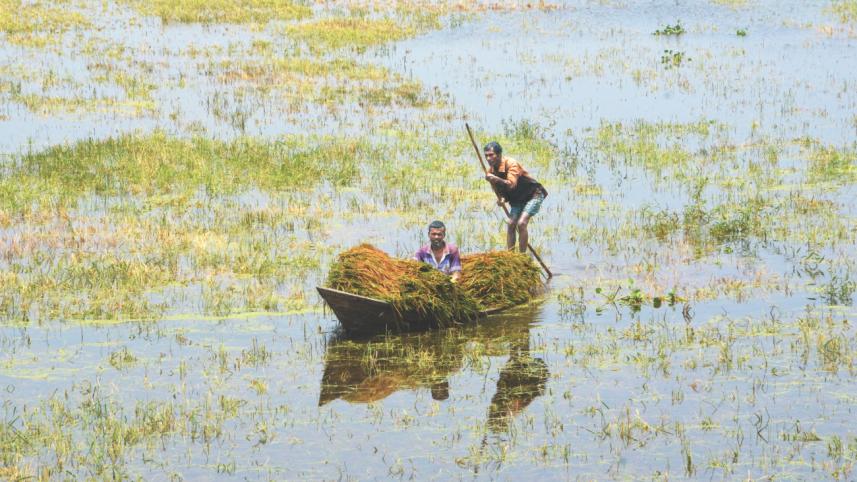Beel Kumari gripped by flood

As soon as the boat filled with Boro paddy reached ashore near the Shib river bridge, Amjad Hossain ran towards it.
With a heavy heart, the 45-year-old farmer from Tanore upazila of Rajshahi took a few sheaf of paddy in his hand and saw water dripping from those.
“My entire paddy went underwater,” lamented Amjad, who cultivated paddy on 15 bighas of land in the Beel Kumari. “Though I was able to save some, I won't be able to recover my production cost.”
Early flood submerged most of the standing Boro paddy on vast areas of the beel (wetland), situated in the Shib river basin in Rajshahi.
Visiting the beel area on Friday, this correspondent saw hundreds of farmers were still harvesting the crops.
They were reaping the submerged Boro crops, loading them on boats, and carrying those to the road on both sides of the Shib river bridge near Gollapara of Tanore.
The farmers were drying the wet paddy under the sun, winnowing the damaged crops in order to take those to nearby markets to sell at a lower price.
“The cost of harvest has increased due to the flood, but the output and paddy price are low,” said Amjad.
He said he had to employ 20 workers, instead of the usual eight, for harvesting crops from one bigha of land while he rented boats at Tk 1,000 per day.
“Moreover, workers do not want to reap paddy from below the water for avoiding unwanted accidents,” he said. “Many crops are also lost in the water current.”
The overflow of Atrai river water flooded the Shib river and Beel Kumari covering Tanore and Mohonpur upazilas of Rajshahi and Manda upazila of Naogaon, according to agricultural experts and farmers.
The water of the beel started rising a week ago and it submerged almost 100 hectares of Boro lands, out of 157 hectares of the beel areas, until yesterday, said the farmers.
However, officials of the Department of Agricultural Extension (DAE) assessed the crop loss would not cross over 15 hectares of land.
“Fearing storms and floods, most of the farmers reaped the crop in advance. Those who did not, had to suffer loses due to the flood,” said Deb Dulal Dhali, deputy director of DAE, Rajshahi.
Shahidul Islam, area coordinator of Bangladesh Resource Centre for Indigenous Knowledge (BARCIK), said, “Boro is the only crop that's cultivated once a year in the beel. The rest of the time the beel is used for fish farming.”
“Also, the Shib river witnesses huge siltation due to an embankment on its eastern bank. For that reason, floodwater does not recede quickly,” he said.
The farmers said although the paddy price in local markets is around Tk 1,200 per maund, the wet paddy sells below Tk 700 per maund.
Kazem Mandal, a farmer of Mohonpur, said he cultivated paddy on five bighas of land this year. “But I won't be able to get a better price since all my crops were submerged. Also, I hardly got 13 maunds of paddy. Normally it would have been more than 20 maunds.”
Many of the farmers echoed Kazem and feared that they would not be able to recover their production cost due to the flood.

 For all latest news, follow The Daily Star's Google News channel.
For all latest news, follow The Daily Star's Google News channel.